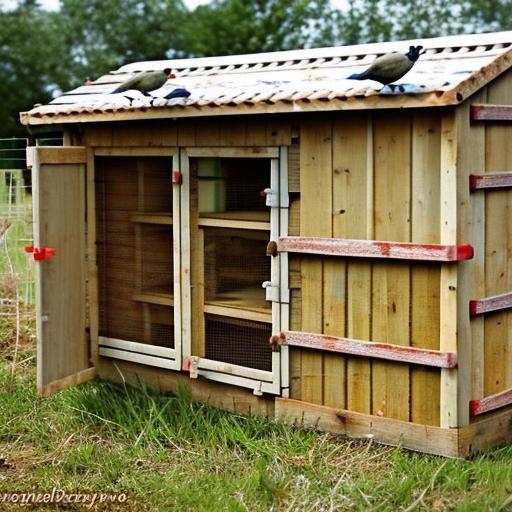A clean and comfortable chicken coop is essential for the health and well-being of your flock. Not only does it provide a safe and secure environment for your chickens, but it also has a direct impact on their productivity. A dirty and uncomfortable coop can lead to various health issues, decreased egg production, and even the spread of diseases.
A clean coop helps to prevent the buildup of bacteria, parasites, and other harmful pathogens that can cause diseases in chickens. It also reduces the risk of respiratory problems caused by poor air quality. Additionally, a clean coop provides a comfortable space for your chickens to rest, roost, and lay eggs, which can contribute to their overall happiness and well-being.
Key Takeaways
- A clean and comfortable chicken coop is essential for the health and well-being of your flock.
- Choosing the right coop design and features can make cleaning and maintenance easier.
- Proper ventilation and airflow are crucial for preventing respiratory issues in chickens.
- Keeping your coop free from pests and predators is important for the safety of your flock.
- Providing adequate space, nesting boxes, and proper feeding and watering can promote happy and healthy hens.
Choosing the Right Coop Design for Your Flock’s Needs
When choosing a coop design, there are several factors to consider. Firstly, you need to determine the size of your flock and how much space they will need. The coop should be spacious enough to allow each chicken to have at least 4 square feet of floor space. It should also have enough roosting bars and nesting boxes for all the hens.
Another important factor to consider is the climate in your area. If you live in a hot climate, you will need a coop design that provides adequate ventilation and airflow to keep your chickens cool. On the other hand, if you live in a cold climate, you will need a coop design that provides insulation and protection from the elements.
There are various coop designs available, including traditional wooden coops, mobile coops, and chicken tractors. Each design has its pros and cons. Traditional wooden coops are sturdy and provide good protection from predators but may require more maintenance. Mobile coops and chicken tractors are portable and allow your chickens to graze on fresh grass but may not provide as much protection from predators.
Essential Features for Easy Cleaning and Maintenance
Easy cleaning and maintenance are crucial for the health and cleanliness of your chicken coop. A coop that is difficult to clean can lead to the buildup of waste, bacteria, and parasites, which can be harmful to your flock. Therefore, it is important to choose a coop design that has features that make cleaning and maintenance easier.
One essential feature is easy access to all areas of the coop. This includes easy access to the nesting boxes, roosting bars, and floor area. The coop should have doors or panels that can be easily opened and closed for cleaning purposes. It should also have removable trays or floors that can be easily cleaned and replaced.
Another important feature is proper drainage. The coop should have a sloped floor or a system that allows for easy removal of waste and water. This helps to prevent the buildup of moisture, which can lead to the growth of bacteria and the spread of diseases.
The Importance of Proper Ventilation and Airflow
| Metrics | Description |
|---|---|
| Indoor Air Quality (IAQ) | The level of pollutants and contaminants in the air that can affect human health and comfort. |
| Sick Building Syndrome (SBS) | A condition where occupants of a building experience acute health and comfort effects that appear to be linked to time spent in a building, but no specific illness or cause can be identified. |
| Carbon Dioxide (CO2) Levels | High levels of CO2 can cause drowsiness, headaches, and reduced cognitive function. |
| Mold Growth | Poor ventilation can lead to excess moisture, which can cause mold growth and lead to respiratory problems. |
| Energy Efficiency | Proper ventilation and airflow can improve energy efficiency by reducing the need for heating and cooling. |
Proper ventilation and airflow are crucial for maintaining a healthy environment in your chicken coop. Poor ventilation can lead to a buildup of ammonia from chicken droppings, which can cause respiratory problems in chickens. It can also lead to high humidity levels, which can contribute to the growth of mold and bacteria.
To ensure proper ventilation and airflow in your coop, it is important to have windows or vents that can be opened and closed as needed. These openings should be positioned in a way that allows for cross ventilation, allowing fresh air to enter the coop while stale air is expelled.
It is also important to consider the size of your flock when determining the ventilation needs of your coop. A larger flock will produce more moisture and ammonia, so you may need larger or additional vents to maintain good air quality.
Keeping Your Coop Free from Pests and Predators
Pests and predators can pose a significant threat to the health and safety of your flock. Common pests include mites, lice, and flies, which can cause irritation and spread diseases. Predators such as raccoons, foxes, and snakes can kill or injure your chickens.
To keep your coop free from pests, it is important to regularly inspect and clean the coop. Remove any debris or clutter that may provide hiding places for pests. Use natural pest control methods such as diatomaceous earth or herbs like lavender and mint to repel pests.
To protect your flock from predators, ensure that your coop is secure and predator-proof. This includes using sturdy materials for the coop walls and roof, burying wire mesh around the perimeter to prevent digging, and installing locks or latches on doors and windows.
Providing Adequate Space and Nesting Boxes for Your Hens

Providing adequate space and nesting boxes for your hens is essential for their comfort and well-being. Chickens need enough space to move around, stretch their wings, and engage in natural behaviors such as scratching and dust bathing.
The general rule of thumb is to provide at least 4 square feet of floor space per chicken. However, more space is always better, especially if you have larger breeds or if you want to allow your chickens to free-range.
In addition to floor space, it is important to provide enough roosting bars for your chickens to perch on at night. The roosting bars should be positioned higher than the nesting boxes to encourage your chickens to sleep on the bars rather than in the boxes.
Speaking of nesting boxes, it is important to provide enough nesting boxes for your hens to lay their eggs. The general rule of thumb is to provide one nesting box for every 3-4 hens. The nesting boxes should be dark, quiet, and filled with clean bedding such as straw or wood shavings.
Proper Feeding and Watering to Promote Health and Well-being
Proper feeding and watering are essential for the health and productivity of your flock. Chickens require a balanced diet that includes a combination of grains, protein, vitamins, and minerals. They also need access to clean and fresh water at all times.
To ensure proper feeding, provide your chickens with a high-quality commercial feed that is appropriate for their age and breed. Supplement their diet with kitchen scraps, fruits, vegetables, and herbs. Avoid feeding them foods that are toxic to chickens, such as chocolate, onions, and avocado.
When it comes to watering, it is important to provide clean and fresh water at all times. Chickens can drink a surprising amount of water, especially during hot weather. Make sure to clean and refill their water containers regularly to prevent the growth of bacteria.
Regular Cleaning and Sanitizing to Prevent Disease and Infection
Regular cleaning and sanitizing are crucial for preventing the spread of diseases and infections in your chicken coop. A dirty coop can harbor bacteria, parasites, and other pathogens that can cause illnesses in your flock.
It is important to establish a regular cleaning routine for your coop. This includes removing any debris or waste from the coop floor, roosting bars, and nesting boxes. Replace soiled bedding with fresh bedding regularly.
Sanitizing the coop is also important to kill any remaining bacteria or parasites. This can be done using natural disinfectants such as vinegar or hydrogen peroxide. Make sure to thoroughly clean and disinfect all surfaces of the coop, including walls, floors, roosting bars, and nesting boxes.
Tips for Managing Waste and Odor Control
Managing waste and controlling odor in your chicken coop is essential for maintaining a clean and healthy environment. Chicken waste can quickly accumulate and produce strong odors if not properly managed.
One tip for managing waste is to use deep litter bedding in your coop. This involves adding a layer of absorbent material such as straw or wood shavings to the coop floor. As the chickens scratch and move around, their waste gets mixed with the bedding, which helps to control odor and promote decomposition.
Another tip is to regularly remove and compost the waste from the coop. Chicken manure is a valuable source of nutrients for your garden, so consider starting a compost pile or using a compost bin specifically for chicken waste.
To control odor, you can also use natural odor absorbers such as baking soda or activated charcoal. These can be placed in strategic locations around the coop to absorb any unpleasant smells.
Happy Hens, Happy Life – The Benefits of a Clean and Healthy Chicken Coop
In conclusion, a clean and healthy chicken coop is essential for the well-being and productivity of your flock. It provides a safe and comfortable environment for your chickens, reduces the risk of diseases and infections, and promotes good air quality.
By choosing the right coop design, incorporating essential features for easy cleaning and maintenance, ensuring proper ventilation and airflow, keeping the coop free from pests and predators, providing adequate space and nesting boxes, offering proper feeding and watering, regular cleaning and sanitizing, and managing waste and odor control, you can create a clean and healthy living space for your chickens.
Taking good care of your flock and their living space not only benefits them but also benefits you as a chicken owner. A clean and healthy chicken coop leads to happier and healthier hens, which in turn leads to increased egg production, better quality eggs, and overall satisfaction in raising chickens. So remember, happy hens equal a happy life!
If you’re looking for tips on how to keep your chicken coop clean and easy to maintain, you might also be interested in learning about the best flooring options for your coop. Choosing the right flooring can make a big difference in how easy it is to clean and sanitize your coop. Check out this article on “The Importance of the Floor in a Chicken Coop” for more information on different flooring materials and their benefits.
FAQs
What is an easy to clean chicken coop?
An easy to clean chicken coop is a type of chicken coop that is designed to make cleaning and maintenance easier for the owner.
What are the benefits of an easy to clean chicken coop?
The benefits of an easy to clean chicken coop include reduced risk of disease and infection, improved hygiene, and less time and effort required for cleaning and maintenance.
What features should I look for in an easy to clean chicken coop?
Features to look for in an easy to clean chicken coop include removable trays or floors for easy cleaning, good ventilation to reduce moisture and odors, and easy access to all areas of the coop.
How often should I clean my easy to clean chicken coop?
It is recommended to clean your easy to clean chicken coop at least once a week, or more frequently if necessary. This will help to maintain good hygiene and reduce the risk of disease and infection.
What cleaning products should I use for my easy to clean chicken coop?
It is recommended to use mild, non-toxic cleaning products for your easy to clean chicken coop, such as vinegar or a mild soap solution. Avoid using harsh chemicals or bleach, as these can be harmful to your chickens.
Can I use a pressure washer to clean my easy to clean chicken coop?
It is not recommended to use a pressure washer to clean your easy to clean chicken coop, as this can damage the wood or other materials and create splinters or sharp edges that can harm your chickens. Stick to gentle cleaning methods using mild cleaning products and a hose or bucket of water.
Meet Walter, the feathered-friend fanatic of Florida! Nestled in the sunshine state, Walter struts through life with his feathered companions, clucking his way to happiness. With a coop that’s fancier than a five-star hotel, he’s the Don Juan of the chicken world. When he’s not teaching his hens to do the cha-cha, you’ll find him in a heated debate with his prized rooster, Sir Clucks-a-Lot. Walter’s poultry passion is no yolk; he’s the sunny-side-up guy you never knew you needed in your flock of friends!







